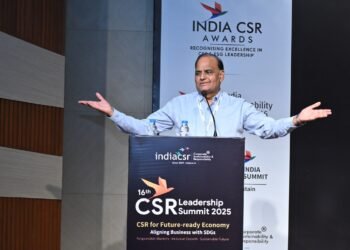In an interview with Rusen Kumar; Shaifalika Panda, Trustee & CEO, Bansidhar and Ila Panda Foundation (BIPF) and Chief of CSR, Indian Metals & Ferro Alloys (IMFA) said, “Corporate success and social welfare are interdependent. Corporate Social responsibility to me means a concept by which a company voluntarily integrates social and environment concerns in its business and in relation to its stakeholders.” Excerpts:
Please give us an overview of Bansidhar & Ila Panda Foundation (BIPF) along with its vision, mission and objectives?
The Bansidhar & Ila Panda Foundation was established in 2011 as the social development arm of Indian Metals & Ferro Alloys Ltd (IMFA) – India’s leading fully integrated producer of Ferro chrome. Our objective is “enabling lives” of the marginalized communities around us through sustainable interventions. We believe “Engage, Educate and Empower them and socio-economic transformation will follow”.
Please share the ideology and thought-process behind the foundation of BIPF.
IMFA (Est 1961) has been engaging with its communities since inception. The company has provided its communities with medical dispensaries, schools and vocational training in a philanthropic way. However the thought process behind the foundation is to strategically implement need based programs as well as bring best case practices through partnerships to create scalable systemic change. All programs are implemented with specific targets and timelines to ensure higher return on investment.
IMFA received the ET 2-GOOD 4-GOOD Commendation for Distinction in the pillars of Corporate Governance, Strategy, and Reporting for 2015-16
Why has BIPF chosen the specific five districts of Odisha?
As the CSR arm of IMFA, our first moral obligation is towards our largest and most important stakeholder. Given that more than 80% of our 6000 people strong work-force is from the local communities of the 5 districts IMFA operates in, it was a natural choice to work towards the welfare of these areas. There are other vital reasons too. Keonjhar, Jajpur and Rayagada have large tribal belts and are among the most backward districts. We felt these districts need maximum assistance in getting greater opportunity. Further it makes sense to continue on the foundation of 5 decades of community building by IMFA as Bansidhar & Ila Panda Foundation can leverage the rapport with the communities for capacity building and taking ownership to improve their quality of life.
Which are the broad operational verticals for BIPF? Please share with us details of the key projects/programs initiated by the Foundation for overall Community Transformation.
Our approach is enabling lives through a multi sectoral approach. We work in the areas of Health and Water & Sanitation as we believe that recurring illnesses is what keeps people in poverty. Thus to break the cycle of poverty it is imperative to provide them with both preventive awareness as well as basic treatment. The second broad area is Education, Skill and Livelihood- this ensures intergenerational change. In both segments a major focus is given on awareness programs as changing the mindset towards Hygiene practices, gender-equality and self-reliance is imperative for sustainable change.
Project Arogyadhara:
- Addresses healthcare issues of communities by providing free medical consultation, medicines at our Dispensaries.
- Organizing Periodic health camps.
- Extensive awareness programs undertaken for preventive measures against diseases.
- Immunization drives undertaken in collaboration with the District Health Administration.
Project Su-Swasthya:
- Building infrastructure (toilets & clean water supply) in villages
- Behaviour Change Communication (BCC) &WASH practices.
Project Adhyayan
- English medium CBSE school Chinmaya Vidhyalaya Therubali in Rayagada district
- Building Infrastructure for tribal schools in Keonjhar and Jajpur,
- Ghanashyam Dash Scholarships for Higher education
- Adult Literacy programs in Chowdwar, Cuttack District
Project Sakshyam:
Promotes Livelihood by empowering both women and youth.
Unnati: envisages social transformation in the hands of women by building their capacity to handle their economic and social life themselves. An integrated Self Help approach (finance, livelihood, education, WASH, health and nutrition etc.) it provides women a platform for social change. These women then take up the role of change- agents for their communities
The “Unnati” model has been recognized by the UN Foundation & GBC, New York as a “Best Case Practice in Women’s Empowerment.”
- Yuva Sakshyam: is designed for youth (boys and girls) from rural areas for placement-backed skill training through Industrial Training Institutes (ITIs) and Skill Centers under DDU-GKY.
Further to the latest announcement in Budget 2018- 2019 with an emphasis on rural development, please share your views about its impact on the rural livelihood transformation.
The Union Budget for 2018-19 with focus on rural development through health, education and ease of living will prove to be a game-changer for this segment. The National Health Insurance Scheme for 10 crore families will not only provide security and peace of mind but save the family from financial crisis in the event of an illness in the family- especially if it is the breadwinner. The Ekalavya Residential Schools in each tribal block by 2022 will ensure opportunity for a secure future for youth and the Mudra Yojana will unleash rural entrepreneurs. The focus on rural women is where I see the major transformation; schemes like Ujjwala Yojana providing LPG connections to 8 crore women or increased allocation of target loans to Women SHGs will go a long way in ensuring women are not dependent citizens but rather contributing members to both their family and society.
What does Corporate Social Responsibility mean to you?
Corporate success and social welfare are interdependent. Corporate Social responsibility to me means a concept by which a company voluntarily integrates social and environment concerns in its business and in relation to its stakeholders. A shared value model should be created where a company incorporates CSR strategy into business strategy. CSR should not be viewed as a cost instead it must be looked upon as an investment in the sustainability of the company.
How has CSR Governance helped BIPF?
It was prior to the CSR Governance that IMFA introspected its community engagement of 5 decades and established the Bansidhar & Ila Panda Foundation to implement target based CSR programs with business expertise. As such we were ahead of the curve when the Companies Act 2013 mandated CSR spending. There is no doubt CSR Governance has ensured a higher success rate in terms of number of beneficiaries within a specific period of time. Our programs in the areas have expanded tremendously in terms of the Skill and Livelihood segment and the next expansion will be in education. It is due to good governance and strictly regulated benchmarks that Bansidhar & Ila Panda Foundation has received recognition at both the national and international level.
Disclaimer: The views expressed by the interviewee in this feature are entirely her own and does not necessarily reflect the views of India CSR Network and its Editor.
Terms & Conditions: India CSR Network does not permit other Websites/Agency to copy or reproduce or reprint the above article/feature in any form.





















